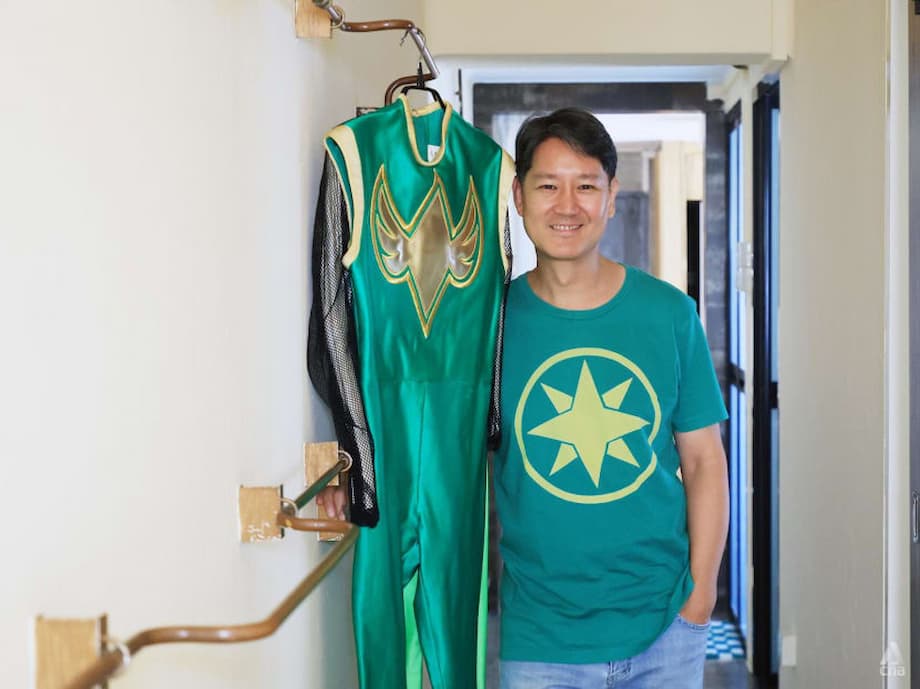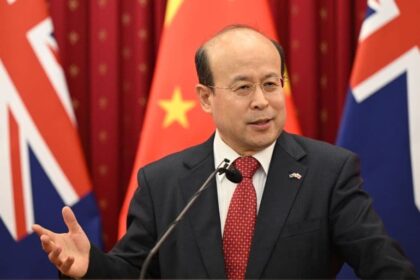Jason Chan: The Green Power Ranger Who Became a Singaporean Tech Pioneer
For millions of fans who grew up watching Power Rangers Ninja Storm in 2003, the Green Samurai Ranger was more than just a superhero—he was a symbol of representation and possibility. Two decades later, the man behind the mask, Jason Chan, is still recognized on the streets, but his journey has taken him far beyond the world of spandex suits and martial arts. Today, Chan is a celebrated filmmaker, entrepreneur, and the co-founder of Cinewav, a Singapore-based startup that is revolutionizing the way communities experience cinema.
- Jason Chan: The Green Power Ranger Who Became a Singaporean Tech Pioneer
- From Kuala Lumpur to Perth: A Childhood of Change
- Landing the Role of a Lifetime: Power Rangers Ninja Storm
- New Beginnings in Singapore: Building a Creative Legacy
- Cinewav: Reinventing the Outdoor Cinema Experience
- Life in Singapore: Family, Recognition, and Giving Back
- Challenges and Lessons Learned
- Broader Implications: Representation, Innovation, and Community
- In Summary
Chan’s story is one of reinvention, perseverance, and a relentless pursuit of creative fulfillment. From his early days as a medical doctor in Australia to his rise as an actor and now a tech innovator in Singapore, Chan’s path defies convention and offers inspiration to anyone seeking to follow their passion.
From Kuala Lumpur to Perth: A Childhood of Change
Born in Kuala Lumpur, Malaysia, in 1971, Jason Keng-Kwin Chan moved with his family to Perth, Australia, at the age of five. Like many children of immigrant families, Chan was encouraged to pursue a stable and respected career. He enrolled in medical school at the University of Western Australia, balancing his academic pursuits with a love for the arts—studying ballet, contemporary dance, and jazz at the Western Australian Academy of Performing Arts.
Despite graduating as a doctor in 1994 and working as a general practitioner for three years, Chan found himself unfulfilled. The long hours and emotional toll of medicine left him yearning for creative expression. He began taking acting classes at night, and soon, the stage called to him more powerfully than the clinic.
Reflecting on this pivotal decision, Chan once shared,
“Some people are born to act, and if they don’t express themselves, it will trouble them for life.”
With this conviction, he left medicine behind and enrolled at the National Institute of Dramatic Art in Sydney, supporting himself as a locum doctor on weekends.
Landing the Role of a Lifetime: Power Rangers Ninja Storm
Chan’s leap of faith paid off when, just a year after graduating from acting school, he landed the role of Cameron Watanabe—the Green Samurai Ranger—in Power Rangers Ninja Storm. The show, filmed in New Zealand, was a global phenomenon, and Chan’s character quickly became a fan favorite. For many Asian viewers, seeing someone who looked like them as a superhero was a rare and empowering experience.
Chan’s portrayal of Cam was notable not just for his martial arts prowess, but for his intelligence and wit. Cam was the team’s tech genius—a role that mirrored Chan’s own lifelong interest in technology. The experience was intense, involving rigorous training with a Japanese stunt team and long days on set. Yet, Chan embraced the challenge, even as he was warned about the risk of being typecast.
He kept memorabilia from his time on the show, including toys and his original costume. His likeness was even used for a Green Ranger figurine, a testament to the impact he made on the franchise.
The Power Rangers Phenomenon and Asian Representation
Power Rangers was more than just a TV show—it was a cultural juggernaut designed to sell toys and inspire young viewers. For Asian fans in particular, Chan’s role was groundbreaking. As he recalled,
“Seeing an Asian superhero, especially one as sarcastic, tough, and edgy as the Green Ranger, was empowering.”
Despite the show’s global reach, Chan found that opportunities for Asian actors in Australia remained limited. The series was not broadcast on free-to-air TV in Australia, and the entertainment industry often relegated Asian talent to stereotypical roles.
New Beginnings in Singapore: Building a Creative Legacy
In 2006, a family friend who worked as a casting agent in Singapore encouraged Chan to relocate. The move proved transformative. Singapore’s vibrant media scene offered Chan the chance to take on leading roles in local productions, breaking free from the constraints he faced in Australia.
It was in Singapore that Chan met Christian Lee, a fellow actor and filmmaker. Together, they co-founded BananaMana Films in 2009, with a mission to produce Asian dramas in English for a global audience. Their first series, What Do Men Want?, was adapted into a TV series and aired in 2014, winning an outstanding directing award at LA Webfest.
Their next project, Perfect Girl, became the first Singaporean drama to be acquired by Netflix, winning seven international awards from sixteen nominations. Chan’s creative talents extended beyond acting—he wrote, directed, edited, and even composed music for many of their projects.
In 2017, BananaMana Films released Jimami Tofu, a feature film set in Okinawa that won the Audience Choice Award at the Hawaii International Film Festival. The film’s success even inspired new travel links between Okinawa and Singapore, demonstrating the power of storytelling to bridge cultures.
Cinewav: Reinventing the Outdoor Cinema Experience
The genesis of Chan’s latest venture, Cinewav, came during an outdoor screening of Jimami Tofu. Chan noticed that while the visuals were stunning, the audio quality was often poor, and noise complaints from nearby residents were common. This sparked an idea: what if audiences could stream high-quality, synchronized audio directly to their smartphones, using their own headphones?
Alongside Christian Lee, Chan developed Cinewav—a patented technology that allows event organizers to host outdoor or silent cinema screenings without the need for large speakers. Instead, viewers watch the film on a big screen and listen to perfectly synced audio through their phones, creating an immersive and personal experience.
How Cinewav Works
Cinewav’s mobile app replaces traditional speaker systems, scaling effortlessly to accommodate any number of users. This eliminates noise pollution and allows screenings to take place in unconventional venues—parks, libraries, schools, and even high-traffic urban spaces. The technology is now patented in five countries and has been used for events at Singapore’s National Stadium, public libraries, and community centers.
As Chan explained in a fireside chat with the Asia Institute of Mentoring, Cinewav addresses several challenges faced by event organizers:
- High-quality, synchronized audio delivery
- Contactless ticketing and content distribution
- Flexible screen arrangements and scalable audio
- Transparent viewer reporting and cost-effective monetization
The platform also offers a curated movie library with titles from leading studios, empowering organizers to create unique cinematic experiences.
Community Impact and Social Mission
For Chan, Cinewav is more than just a business—it’s a tool for building and transforming communities. The company donates screens to low-income neighborhoods and powers free screenings in Singapore and abroad. By making cinema accessible and inclusive, Cinewav fosters social connection and cultural exchange.
Chan’s commitment to community is reflected in his own words:
“Cinewav is a way to bring people together, to create shared experiences, and to make the magic of cinema available to everyone.”
This vision aligns with the broader mission of the Asia Institute of Mentoring, which seeks to create a kinder, more inclusive, and sustainable world through mentorship and social entrepreneurship.
Life in Singapore: Family, Recognition, and Giving Back
Now in his early fifties, Jason Chan has fully embraced life in Singapore. He is married to Sang Min Lee and is the proud father of an eight-year-old son. Despite his many achievements, Chan remains humble and approachable, often engaging with fans who recognize him from his Power Rangers days.
He continues to act, write, and direct, appearing in local films such as The Leap Years and Sing to the Dawn, as well as Mediacorp dramas like My Sassy Neighbour and Parental Guidance. His creative output has earned him numerous awards, including the Platinum REMI at Worldfest Houston and accolades for writing, directing, and editing at LA Webfest.
Chan’s story has been featured in major media outlets, from Channel NewsAsia to NST Online, and he remains a role model for aspiring artists and entrepreneurs. His journey from medical doctor to actor to tech innovator is a testament to the power of following one’s passion, even in the face of uncertainty.
Challenges and Lessons Learned
Chan’s path has not been without obstacles. Leaving a stable career in medicine for the unpredictability of the arts was a daunting choice, especially for someone from an immigrant background. In Australia, he faced typecasting and limited opportunities for Asian actors. Even after achieving international fame, he had to reinvent himself multiple times—first as a filmmaker, then as a tech entrepreneur.
Yet, Chan’s resilience and willingness to take risks have been key to his success. He often emphasizes the importance of perseverance, describing his journey as a series of small steps:
“The progress is made by always putting one foot in front of the other.”
This mindset has allowed him to adapt, innovate, and make a meaningful impact in every field he has entered.
Broader Implications: Representation, Innovation, and Community
Jason Chan’s journey holds broader significance for the entertainment and technology industries, as well as for society at large. His role as the Green Samurai Ranger helped pave the way for greater Asian representation in global media, inspiring a new generation of viewers to see themselves as heroes.
Through BananaMana Films, Chan has demonstrated the power of Asian storytelling on the world stage, breaking barriers and challenging stereotypes. With Cinewav, he is leveraging technology to democratize access to culture, making high-quality cinema experiences available to diverse communities.
Chan’s story also highlights the value of interdisciplinary thinking—combining the empathy of a doctor, the creativity of an artist, and the problem-solving skills of an entrepreneur. In an era where the boundaries between industries are increasingly blurred, his example shows that innovation often comes from those willing to cross traditional lines.
In Summary
- Jason Chan, best known as the Green Samurai Ranger in Power Rangers Ninja Storm, has built a remarkable career as an actor, filmmaker, and tech entrepreneur in Singapore.
- Born in Malaysia and raised in Australia, Chan left a career in medicine to pursue his passion for the arts, overcoming challenges related to representation and typecasting.
- In Singapore, he co-founded BananaMana Films, producing award-winning content and pioneering Asian dramas in English for global audiences.
- His latest venture, Cinewav, is transforming outdoor and silent cinema experiences with patented technology that delivers high-quality, synchronized audio to audiences via their smartphones.
- Cinewav is used for community screenings in Singapore and abroad, supporting social inclusion and cultural exchange.
- Chan’s journey exemplifies perseverance, innovation, and the importance of following one’s passion, offering inspiration to creatives and entrepreneurs alike.












